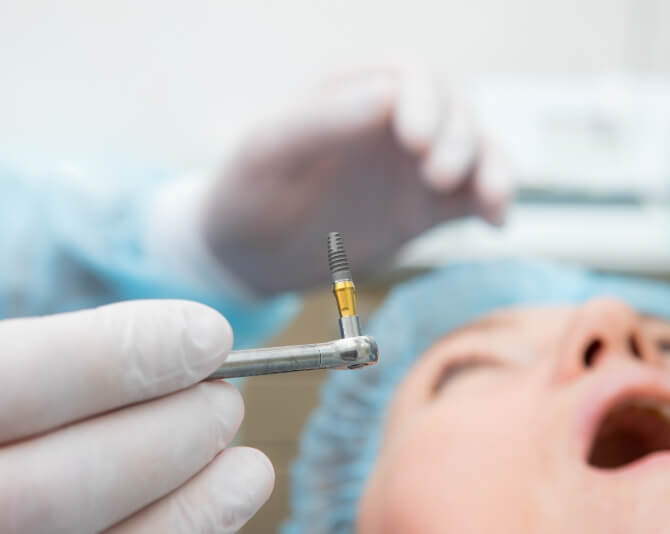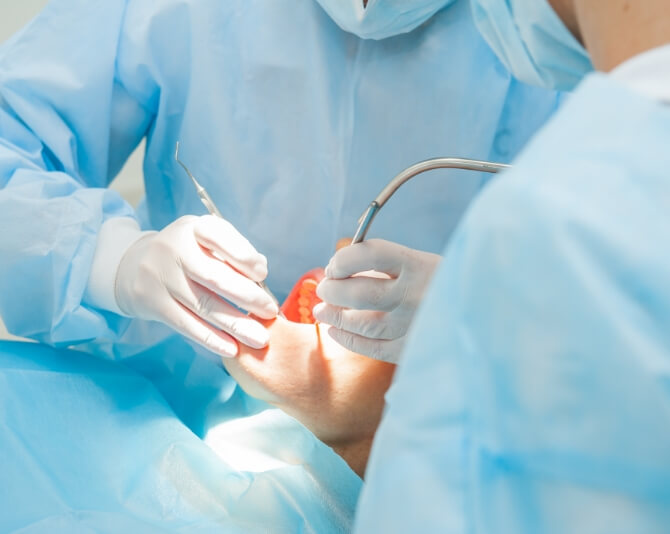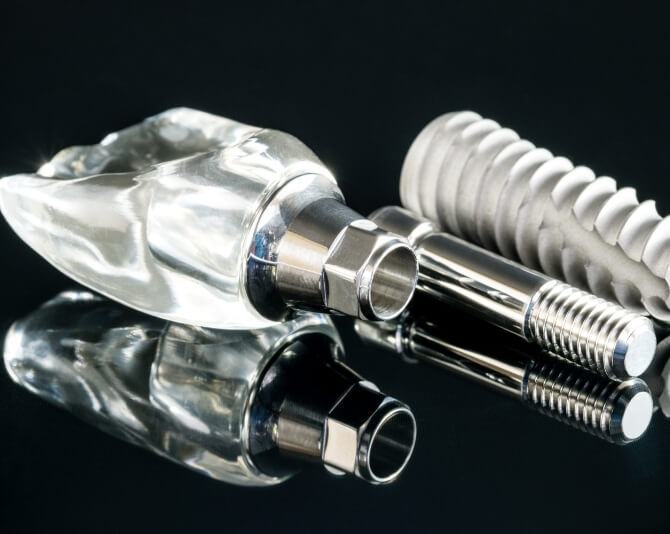Unlike many other dental offices, Dr. Shah provides in-office dental implant placement, allowing patients to have their smile completely rebuilt and renewed under one roof. With this advanced restorative treatment, he can recreate the entire structure of one or more missing teeth, allowing the replacements to feel and function just like the real thing. During your consultation, he’ll walk you through the entire process for receiving dental implants in Edison and help you determine whether implant-retained restorations are right for you. If you’re ready to make a lifelong investment in rebuilding your smile, contact us today.
Why Choose Edison Prosthodontics for Dental Implants?
- Computer-Guided Dental Implant Surgery for Optimal Results
- Dental Implant Placement & Restoration Completed Under 1 Roof
- Metal-Free Zirconia Dental Implants Available
What are Dental Implants?
A dental implant is a titanium or zirconia post that is placed beneath the gum line and into the jawbone to replace the missing root of your natural tooth. Once this process is complete, it biologically fuses with the bone to provide it with blood flow and stimulation to keep it from deteriorating. After giving the mouth time to heal, an abutment, which is a small connector piece, will be attached, which will hold your custom-crafted bridge, denture, or crown. Dental implants are the only tooth replacement option to restore the entire structure of a missing tooth, allowing them to look, feel, and function just like natural.
The 4-Step Dental Implant Process
Since dental implants rebuild missing teeth from the roots up, they require a more involved process than getting dentures or a dental bridge. After all, the dental implants need to be placed into the jawbone itself! Thanks to his specialized training as a prosthodontist, Dr. Shah has the experience and advanced training needed to handle almost every dental implant placement personally. In most cases, you can expect to enjoy start-to-finish treatment right here in our office. While every tooth replacement journey is slightly different, read on to learn more about the four main steps in the dental implant process.

Initial Dental Implant Consultation
First, you’ll meet with Dr. Shah for a consultation. He’ll discuss your goals for your smile with you, review your medical history, and inspect your mouth to make sure you’re a good candidate for dental implants. Diagnostic records such as digital impressions, scans, photographs, and CT scans will be obtained. Using this information Dr. Shah will determine if you are a candidate and what treatment path is best for you.

Dental Implant Surgery
Next, you’ll return to our office for your dental implant surgery. Once you’ve settled into the examination chair, we’ll make sure you’re completely comfortable by numbing your mouth and potentially offering nitrous oxide sedation. Then, the dental implant surgery can begin. Dr. Shah uses advanced dental implant technology to ensure all the guesswork is taken out of your procedure and you enjoy the most precise results. He’ll make one incision in your gums for every implant you’ll be receiving to access your jawbone. There, the implant(s) will be placed into carefully pre-planned positions within the bone tissue. Then, the gums will be closed around the implant, and you’ll be sent home to heal.

Dental Implant Osseointegration & Abutment Placement
It will take several months before you’ll be ready to move on to the final stage of your dental implant treatment. Your body will need to heal for about 4-6 months as your implant undergoes osseointegration. This is the process where the implant fuses with the jawbone, essentially becoming a part of it to form a strong foundation for your teeth. While this may seem like a long time to wait, successful osseointegration is what gives your dental implant the potential to last a lifetime.
Then, you’ll need to have a small connector piece called an abutment attached to every implant post you’ve received. As you heal from this quick minor surgery for the following weeks, your custom restoration will be crafted.

Delivery of Dental Implant Restorations
Finally, it will be time to have your brand-new replacement teeth anchored in place. When you arrive, we’ll use an ISQ implant stability monitor to ensure that your implants are ready to have the restorations attached to them. If they are, Dr. Shah will secure your custom-made crown, bridge, or denture in place and check to see that everything lines up properly. Once he’s ensured that you’re happy with your results, you’ll be ready to walk out of our office with a complete and confident smile.
Benefits of Dental Implants
Over 3 million people in the United States currently have dental implants, and that number is expected to increase by around 500,000 each year. Why are dental implants becoming more and more popular? It’s simple: they come with unique benefits that traditional tooth replacements are unable to provide. During your initial consultation, we’ll go over the benefits of dental implants in Edison with you and paint a detailed picture of how this treatment could improve your life. Below is a summary of some of the key advantages to getting a sturdy implant restoration.

Day-to-Day Benefits
You use your teeth every day to eat, speak, and smile. Replacing missing teeth with dental implants makes it much easier to accomplish these tasks and lead a full life.
- Freedom to Eat What You Want: You don’t have to worry about staying away from certain foods when you have dental implants. Once the posts have joined with the jawbone, they’ll provide enough bite force and chewing strength to allow you to eat all your favorite meals without restriction.
- Clearer Speech: Sometimes traditional dentures slip while you’re talking, causing you to slur or mutter the last part of your sentence. When your prosthetic teeth are attached to implants, they’ll remain anchored in place so that they don’t interfere with your speech.
- Improved Appearance: Your implants will feel extremely comfortable and will look very natural next to your other teeth. You’ll be much more confident about your self-image as a result, allowing you to share your new smile with the world without reservation.
- Simple Maintenance: Dental implants don’t require any form of complex care. Just like your regular teeth, all they need is daily brushing and flossing along with regular dental checkups in order to stay healthy for many years.

Health Benefits
Dental implants act as replacement tooth roots, and as such, they benefit your health in various ways that you won’t see with dentures that sit on your gums or bridges that are attached to your teeth.
- Stop Bone Loss: The jawbone starts to resorb after tooth loss, meaning it breaks down so that its raw materials can be used elsewhere in the body. Implants actively prevent bone loss from occurring, keeping your jawbone healthy.
- Healthier Lifestyle: One of the most important advantages of being able to eat whatever you want with implants is that you can more easily maintain a nutritious diet that will keep your entire body happy and healthy.
- No Dental Drift: Teeth have a tendency to drift into empty space, but as long as any gaps in your smile are filled with dental implants, you won’t have to worry about this issue.

Long-Term Benefits
You’ll come to appreciate your dental implants more and more as the years go by thanks to the following benefits:
- Youthful Appearance: Your dental implants will help keep you looking young by preventing the deterioration of the jawbone that often leads to a sunken facial appearance.
- Longevity: Traditional restorations are usually estimated to last between 5 to 10 years. Dental implants are much more durable by comparison. You can keep them for decades without needing a replacement.
- Highly Successful Treatment: Due to the many advancements made in the field of dental implants, the treatment is highly effective, with a success rate of 95%!
Who Dental Implants Can Help
The best way to learn whether you’re a good candidate for dental implants in Edison is to visit us for a consultation. We’ll get to know more about what you’re looking for in a tooth-replacement solution and walk you through how dental implants can restore your smile. This treatment is a fit for most people because it is so versatile. It can address any level of tooth loss, from a single missing tooth to much more extensive cases.

Who is a Good Candidate for Dental Implants?
Common traits of candidates for dental implants include:
- Fair overall health. You should be free of any health conditions that could seriously compromise your body’s ability to heal after minor surgery.
- Good oral health. It is important that you are free of active gum disease and other oral health problems that might compromise your implants’ success.
- Adequate jawbone density. The bone must be strong enough and thick enough to support dental implants.
If you aren’t sure if you meet the above criteria, schedule a consultation with a qualified dental implant dentist in Edison. Dr. Shah will evaluate your oral health and recommend your next steps. Most adults do qualify for dental implants, either right away or after some preliminary treatments. Once your mouth is ready for implants, our team will get to work on rebuilding your smile.
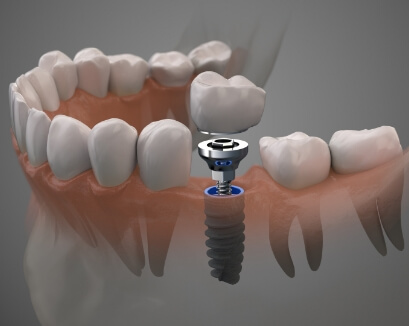
Missing 1 Tooth
For a single missing tooth, we can place one dental implant beneath the gumline and attach a custom-crafted dental crown that is designed to flawlessly blend in with your surrounding teeth. Filling the gap in your arch will reduce your risk of developing additional oral health problems down the road. For example, it will lower the chances that you will suffer from misaligned teeth as well as further tooth loss. This type of restoration is superior to a traditional bridge because it rebuilds the lost tooth from the root up and does not require the support of the nearby teeth.
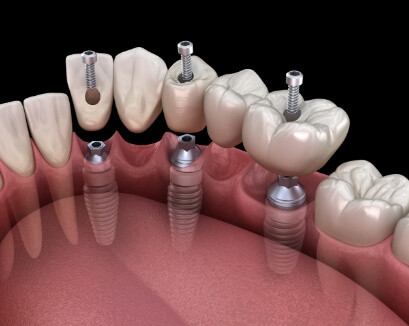
Missing Multiple Teeth
If you’re missing several consecutive teeth, we will likely recommend an implant-retained bridge. To support this, we will place one dental implant on each side of the gap in your smile. Then, we will attach the custom bridge to your abutments, thereby filling the space and completing your arch.
If your missing teeth are not consecutive, you might need multiple single-tooth implants. An implant-supported partial denture, a single prosthetic that fills in multiple gaps and is secured by just a few strategically placed implants, might also be an option for you.
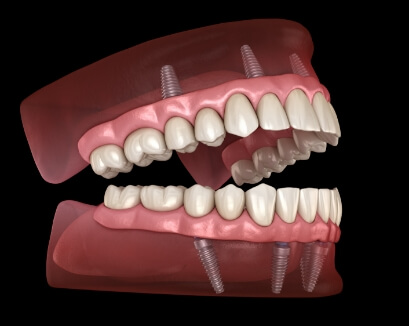
Missing All Teeth
Missing an entire arch of teeth requires a complete denture to be placed. In order to secure the prosthetic, we’ll place four or more dental implants along the jawbone. These will firmly support the new teeth, eliminating any slipping or shifting while you eat or speak, like you might experience with a traditional denture.
There are a few different types of implant dentures, including those that are permanently fixed in place as well as those that are easy to remove. Dr. Shah will recommend the type of prosthetic that he believes is best for your unique circumstances.
Understanding the Cost of Dental Implants
During your initial consultation, we’ll walk you through the entire implant process and outline several cost-defining factors, such as how many implants you require and what type of restoration you need to have placed. Although the cost of dental implants in Edison may be higher upfront, they’re actually the most cost-effective tooth-replacement solution available, because they have the potential to last three times as long as traditional restorations. During your appointment, our team will be more than happy to go over how you can use your insurance and financing to make the treatment easily affordable.
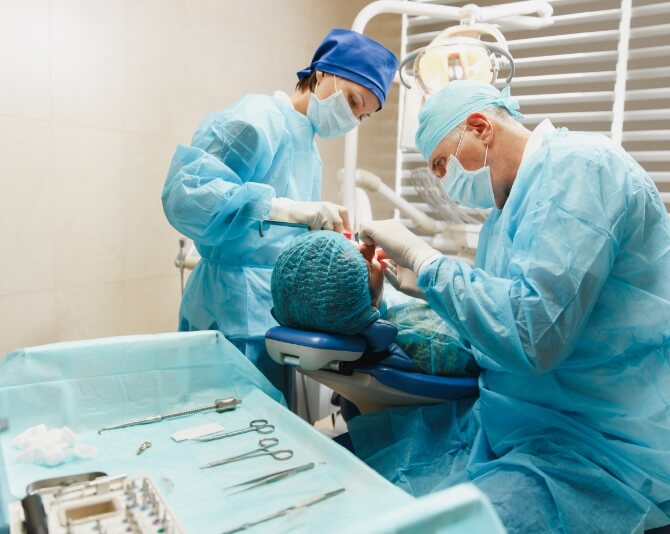
Preliminary Treatments & Dental Implant Surgery
One of the most pivotal parts of your dental implant consultation is to determine if you need preliminary treatment before undergoing dental implant surgery. Bone grafting, periodontal therapy, or tooth extraction may be necessary if your oral health is lacking in any particular area. Should you require any or all of these treatments, you can expect them to be lumped into the overall cost of your treatment.
Your dental implant surgery is also another factor that plays into the cost of your care. Fortunately, Dr. Shah is a highly qualified professional who offers implant placement and restoration in-house. As a skilled prosthodontist, he will ensure that your new smile looks and feels its best, and you won’t need to worry about paying another implant dentist in Edison for the surgical portion of your treatment.
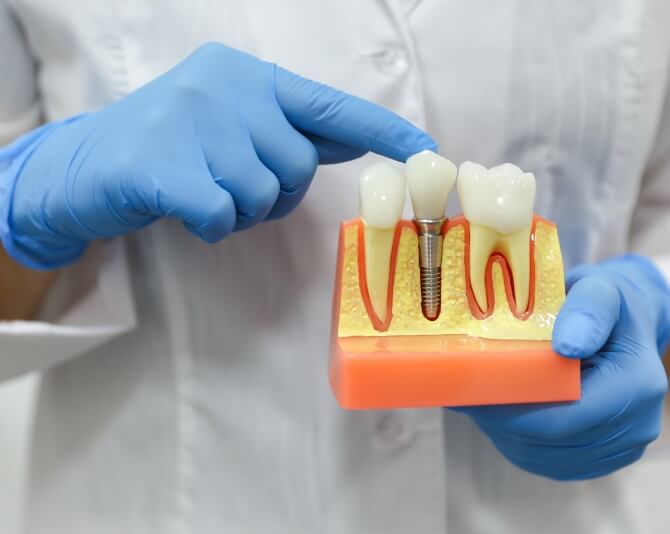
The Parts of Your Dental Implant
The parts of your dental implants are also incorporated into your total cost, and Dr. Shah will go over these during your initial consultation:
- How many implants you will need – Naturally, it costs much less to receive one single dental implant as opposed to four or eight that are required for a full implant denture.
- The materials used – While titanium and zirconia are the most common materials used to create dental implants, we will also consider the location of your implant and if you need short or long prosthetics.
- The type of restoration – Whether it is a crown, bridge, or denture, dental implants are highly versatile. Not to mention, producing a single crown is much less expensive than a full denture.
- The brand – Just like cars, dental implants have different brands and manufacturers. Size, shape, texture, and length can be different. This is usually because one particular brand will be used to address the certain needs of a patient (i.e., an allergy to metal requires zirconia implants). We will discuss the brand and manufacturer we plan to use for your situation during your consultation.

How Dental Implants Can Save You Money
Dental implants in Edison offer more and greater benefits than any other type of tooth replacement. For example, they look incredibly natural and help to preserve jawbone mass. They are able to handle virtually any food, and they have the potential to last for decades. In fact, they last for so long that they are a better long-term investment than traditional prosthetics.
With dental implants, you can worry less about buying dental adhesives to keep your prosthetics firmly in place, and you can avoid spending money on special cleaners to keep them free of bad bacteria and harmful particles. You’ll also be pleased to learn that by choosing dental implants to replace your missing teeth, you will reduce your risk of developing many of the most common systemic diseases that can occur as a result of tooth loss.
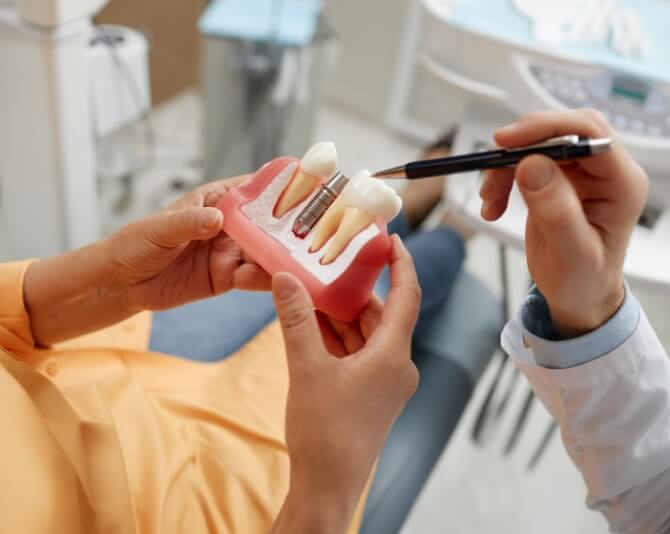
Does My Dental Insurance Cover Dental Implants?
Some dental insurance companies cover dental implants, while others do not. Even if your plan does not cover the implants themselves, it might cover your restoration or other parts of your treatment. You can also investigate whether your medical insurance might help to cover part of your treatment (it might apply to dental implant surgery).
Our team will be happy to work with you to help you figure out how your benefits apply — we are experts at dealing with insurance. We are even in-network with many PPO providers. Additionally, we can help you apply for low-interest financing through CareCredit, which can be the key to arranging an affordable monthly implant payment plan in Edison.
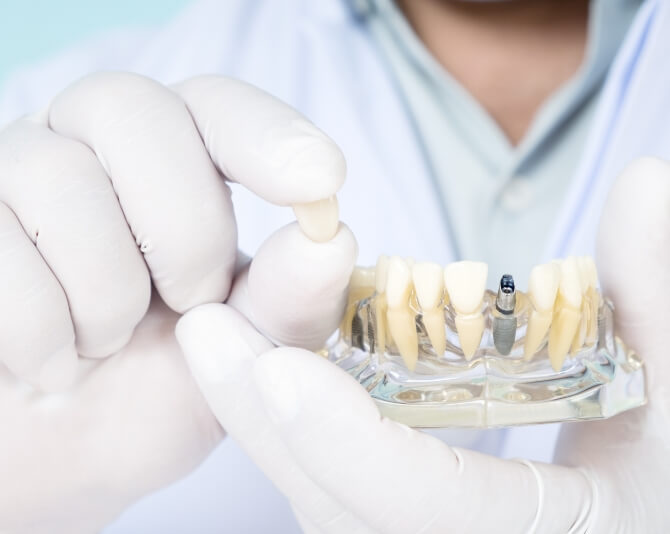
Making Dental Implants Affordable
Even if you’re uninsured or need help to pay any existing balance of your treatment, our team at Edison Prosthodontics can help you apply for flexible financing through CareCredit. By enrolling in a low or zero interest payment plan, you can prepare to move forward with your dental implant treatment while managing your budget.
Advanced Dental Implant Procedures
To be considered a good candidate for dental implants, you need to have enough bone in your jaw to join with and support the posts. If there’s not enough bone density at the potential implant site, you may require some preliminary treatment before the dental implant process can begin. Here are a few examples of the advanced procedures that we might use in order to prepare your jaw to support a new smile.
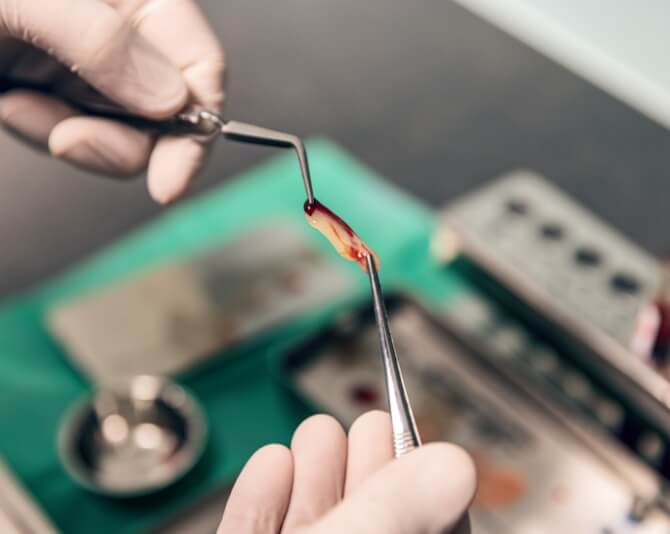
Bone Grafting
When your teeth are missing, the part of the jaw that used to support them will start to deteriorate due to a lack of stimulation. If too much bone is lost, it could compromise your ability to receive dental implants. However, it’s often possible to rebuild a deteriorated jawbone thanks to a procedure known as bone grafting.
This treatment involves taking bone tissue from another part of your body and transplanting it into the weakened parts of the jaw. The body is encouraged to start producing new bone cells around the grafting material, thus repairing the jaw.
It can take anywhere from 3 to 9 months to completely heal after a bone grafting procedure. Once you’ve fully recovered and your jaw has the proper level of bone density, we can start planning your dental implant placement surgery.
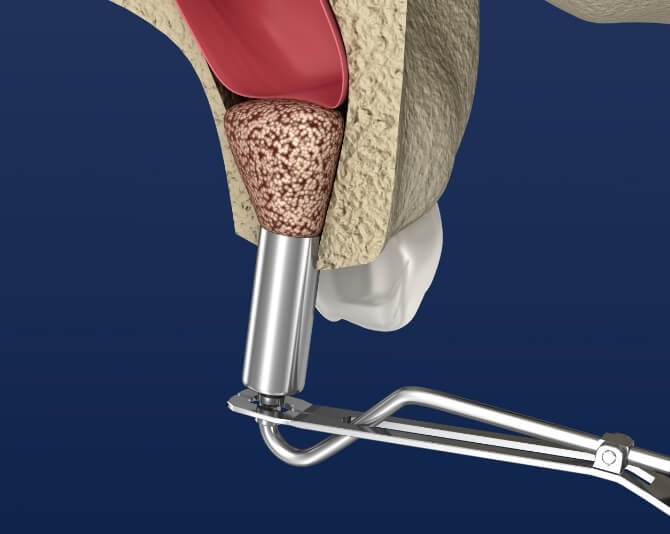
Sinus Lift
Placing dental implants in the upper back jaw can be difficult. Not only is there generally less bone density in that area, but the sinuses can potentially get in the way. To add the necessary bone and ensure that the sinuses don’t cause any unnecessary complications, we may perform what’s known as a sinus lift.
After making an incision in your gums, we’ll create a small window in your jawbone. Then, we’ll gently lift the membrane of the sinus cavity so that we can fill the newly empty space with grafting material. This makes the jawbone thicker and moves the sinuses so that they won’t be damaged by dental implant placement.
Just like with a regular bone graft, it takes time for the mouth to fully heal after you’ve completed a sinus lift. Recovery can take anywhere between 4 and 12 months; we’ll let you know when it’s safe to move forward with the dental implant process.

Ridge Expansion
The ridge bone is the part of the jaw that surrounds and supports the teeth. If the ridge bone is too narrow as a result of bone loss, we may not be able to place dental implants. With a ridge expansion, we can ensure that your ridge bone is wide enough for your implant posts.
To perform this procedure, we’ll need to separate the ridge bone into inner and outer segments. Bone grafting material is inserted into the space between them. This effectively widens the jaw, allowing us to place dental implants once your mouth has fully recovered.
CT-Guided Dental Implant Surgery
With the help of CT-guided implant surgery, Dr. Shah is able to ensure an exceptional level of precision and confidence for his patients. The process is simple – you’ll receive a thorough, three-dimensional digital scan of your teeth, as well as a CT scan that captures every detail of your jaw, even down to the location of the sinuses and facial nerves. This valuable information makes the creation of a surgical guide very simple while virtually eliminating the need for guesswork. The result? Maximized clinical success and a brand-new, recompleted smile that’s built to last.
Dental Implant Technology
Dr. Shah’s advanced training and skills are just one reason why his patients enjoy successful treatment. He complements his skills with several forms of highly advanced dental implant technology in Edison. Read below to learn about some of the instruments in our office that contribute to a more precise, lower-risk procedure from beginning to end.
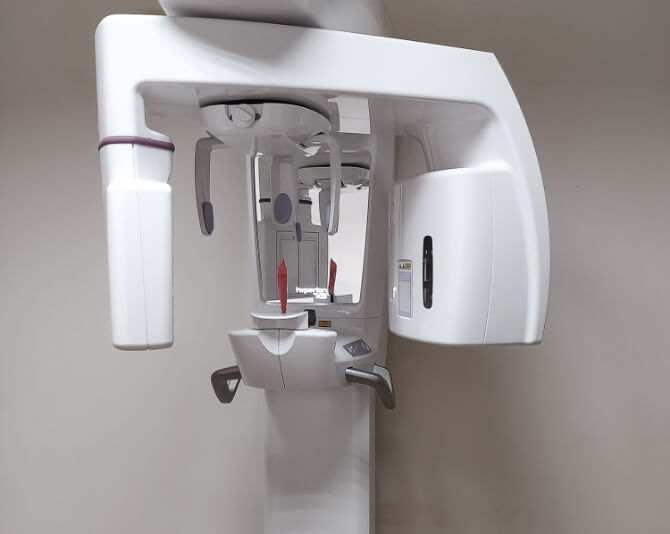
3D Cone-Beam Imaging
Traditional digital X-Rays capture useful information about the oral structures, but they do not provide the level of detail that is necessary for precise dental implant treatment. Our CBCT scanner, also known as a cone beam scanner, uses a cone-shaped beam of radiation to produce three-dimensional digital images of your jawbone, teeth, nerves, and connective tissues.
There are many different CBCT scanners on the market. After careful research, Dr. Shah elected to invest in a product from Carestream. Carestream is a worldwide leader in medical imaging technology that has provided our office with a CBCT machine that is reliable, easy to use, and safe for most patients.
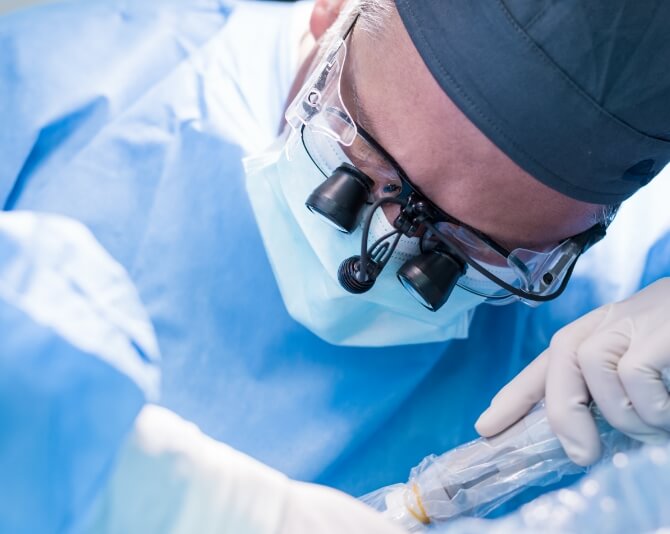
Guided Dental Implant Surgery
Dr. Shah takes the time to create surgical guides before he places dental implants whenever the case requires it. Such guides help him to insert the implants at the correct location, angle, and depth. This lowers the risk of human error and can lead to shorter healing times and better overall treatment outcomes.
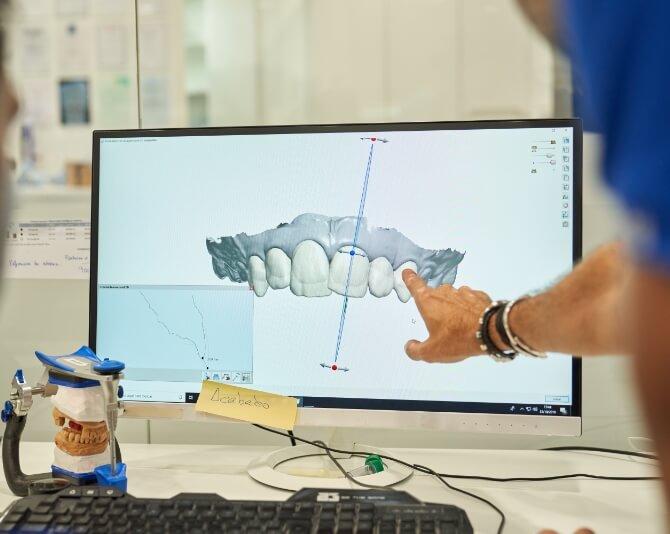
Trios® Digital Impression System
Preparing a beautiful, functional restoration is a key part of the dental implant process. To ensure that your new teeth fit perfectly and feel comfortable, Dr. Shah uses a digital impression system. By simply moving a small wand around your mouth, our team can capture an accurate three-dimensional representation of your jaw and remaining natural teeth, which can then be used to design your custom restoration.
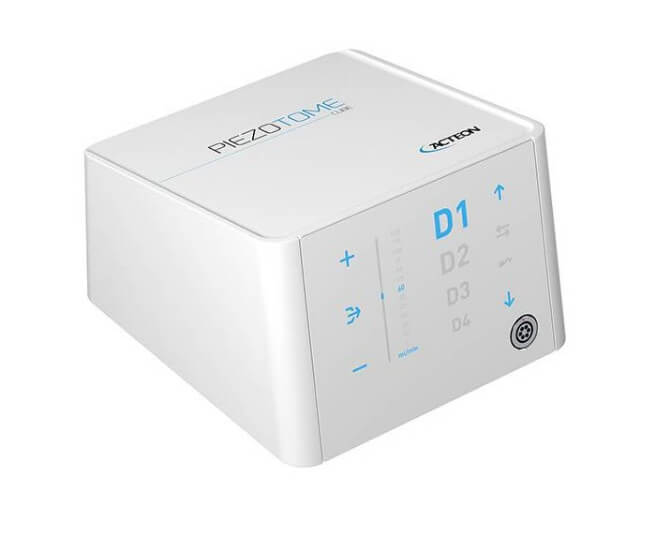
Acteon Cube, PIEZOTOME
Extractions are often an important preparatory step in the dental implant process. Unfortunately, traditional extractions can cause trauma to the surrounding tissue necessitating an extended recovery period. The PIEZOTOME technology minimizes such trauma making it more likely that you can benefit from immediate implant placement.
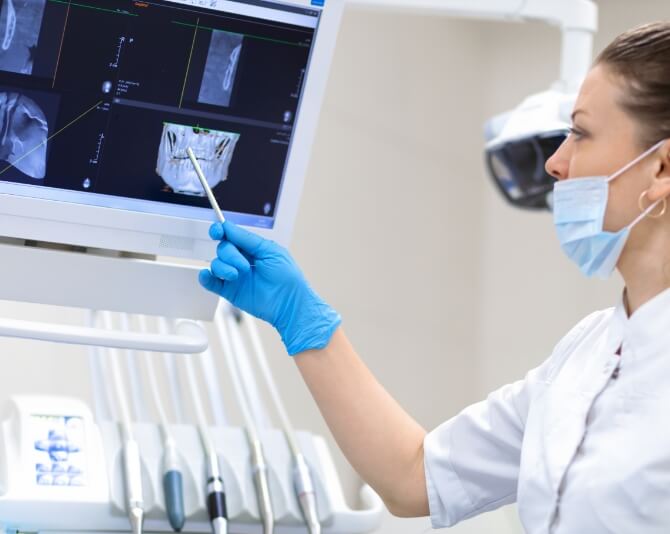
Implant Stability (ISQ) Monitor
Implant stability quotient (ISQ) is a metric that represents how well a dental implant has integrated with the surrounding bone. An ISQ monitor allows our team to determine whether your dental implants are ready to support your new, artificial teeth. It can also be used immediately after implant placement as a monitoring aid. If you ever suspect that there is a problem with your dental implants, this technology along with Dr. Shah’s training and expertise will provide reliable diagnosis and solutions.
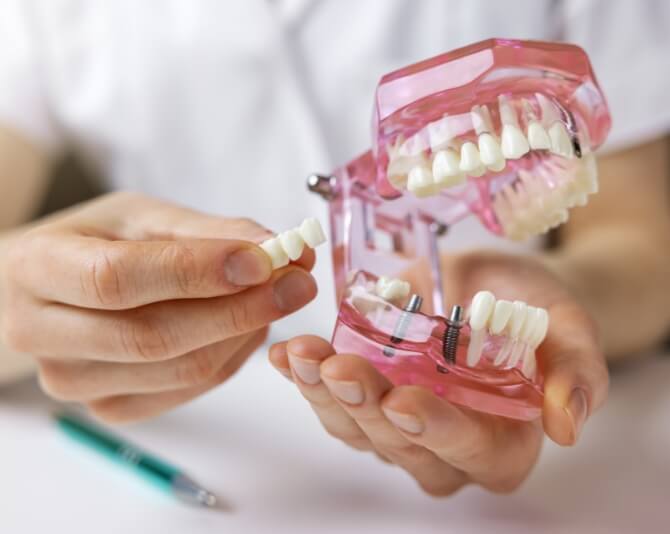
Zirconia Dental Implants
This one isn’t so much a technology as it is a material. Most dental implants are constructed out of a titanium alloy, which is quite strong and known for its biocompatibility. It’s used for many other types of surgeries throughout the body, such as hip replacement. However, for patients with metal allergies or a sensitivity to metal, zirconia dental implants are available. These metal-free implants are made of a ceramic material and are also quite strong and biocompatible. If you are concerned about having metal in your mouth, ask us about our zirconia dental implants.
Maintaining & Caring for Your Dental Implants
Now that you have your dental implants, the next and most important step is to learn how to properly maintain them. Appropriate dental implant care in Edison will ensure your prosthetics remain firmly in place and free of damage or disease. Although they’re incapable of decay, they can be plagued by gum disease and external harm. Below you will find a list of tips designed to help you avoid problems and keep your new teeth looking and feeling their best well into the future.
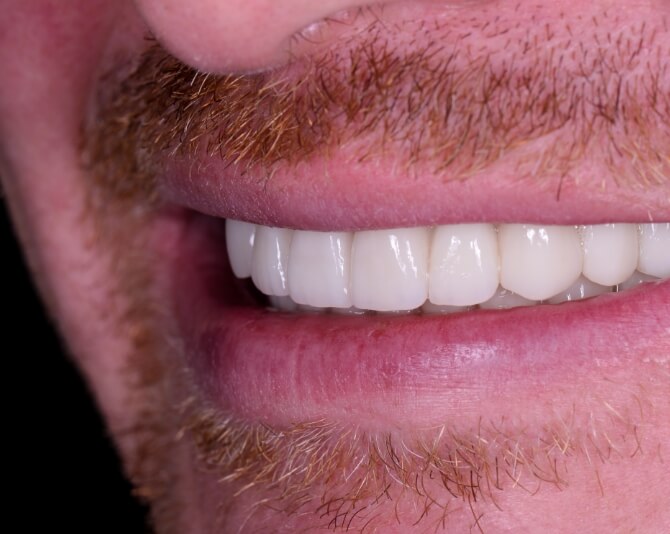
Make Oral Hygiene a Priority
Dental implants require regular maintenance, which means brushing, flossing, and rinsing. To avoid the potential for gum disease, you’ll need to brush twice a day for two minutes, use non-abrasive fluoride toothpaste, and floss to minimize the risk of plaque and bacteria spreading beneath the gum line. This will keep your implants from experiencing inflammation and infection often caused by periodontal disease.

Maintain a Balanced Diet
Believe it or not, the foods you consume can positively or negatively impact your dental implants in Edison. Eating too many sugars or starches can result in gum disease and serious infection over time, which can lead to dental implant failure. However, incorporating healthier foods like fruits, vegetables, low-fat dairy, lean proteins, and leafy greens will give you the nutrients you need to maintain optimal functionality and health.

Break Bad Habits
Unhealthy habits can lead to serious damage for both your real and artificial teeth. Smoking can weaken your immune system and cause your dental implants to never fuse with the bone. It can also increase your chances of gum disease. Using your teeth as tools and eating ice can lead to breaks, chips, and fractures that require more time and money to be spent replacing your customized restoration and potentially your implant posts. It is best to give up these bad habits early on, so you can avoid trips to the emergency dentist in the future.

Protect Your Dental Implants
Whether you enjoy playing sports or struggle with grinding your teeth at night, a customized mouthguard can be a great investment. You don’t want your new implants to become damaged as a result of playing your favorite game, and you’d rather avoid seeking a replacement because you’re prone to clenching your teeth because of stress. To ensure your new smile remains fully intact and free of any potential damage, talk to your implant dentist in Edison about having a customized mouthguard made to comfortably fit your smile.

Schedule Regular Dental Checkups
Finally, you’ll want to maintain regular dental checkups and cleanings. These may only be twice a year, or your dentist may recommend more frequently at first. No matter the frequency, these visits are designed to allow our team to examine your smile, check for any signs of decay or gum disease, and make sure there are no minor or major damages to your dental implants. Although it may seem odd to continue seeing the dentist after receiving these prosthetics, rest assured it is one of the most beneficial ways to take optimal care of your new smile.
Dental Implants Post-Op Instructions
Some recovery time is necessary after dental implant placement, but don’t worry; we’ll give you clear directions on what you need to do to protect your smile as well as what you can normally expect during the process. If you notice any unusual symptoms, don’t hesitate to reach out to us for help. Below are some of the basics covering what will happen after your surgery as well as some of the post-op instructions that you might receive.

What to Do Directly After Dental Implant Surgery
A blood clot will start to form around the surgical site to ensure a smooth healing process. You need to keep this blood clot in place, so avoid doing anything that could dislodge it. Otherwise, you could develop a painful condition called dry socket that causes healing to take longer than it should. This includes spitting, drinking through straws, and smoking. Additionally, you should not touch the surgical site with your fingers or your tongue.

Common Side Effects When Recovering from Dental Implant Placement
There are a few mild side effects that you should expect for at least the next few days after you get dental implants:
- There may be intermittent bleeding around the surgical site. You can keep it under control by applying light pressure with some gauze.
- Swelling may occur for 3 to 7 days. Applying a cold or warm compress to the area can help.
- You may experience general discomfort in your mouth. Take any prescribed pain medication as directed to relieve it.
All of these symptoms should fade on their own given enough time. Call us immediately if they don’t seem to be subsiding when they should.

Your Diet After Dental Implant Surgery
For at least a few days after you get dental implants, your diet should consist entirely of soft foods that won’t put too much pressure on your smile while you’re recovering. Mashed potatoes, yogurt, ice cream, soup that isn’t too hot, scrambled eggs, and pasta are all excellent choices for post-implant surgery patients. You can return to eating other foods once you feel like your mouth can handle it. That said, you still need to be gentle with your implant post until it can join with the bone. Avoid chewing on the implant site and continue to stay away from crunchy or tough foods as much as possible.
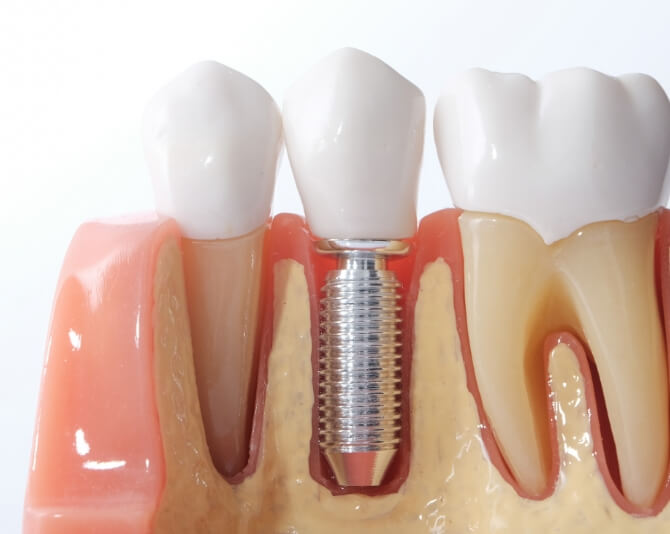
Post-Op Health & Oral Hygiene
You’ll be able to brush your teeth as you normally would the day after surgery. Be very careful near the surgical sites; you don’t want to disturb the implant posts or the protective blood clot. Get in the habit of rinsing your mouth two or three times a day with salt water to lower your risk of post-surgical infection. Make sure that any mouthwash you use does not contain high levels of alcohol.

What to Do After Your New Teeth Are Attached
The recovery process after new teeth are attached to implant posts is much simpler. There won’t be any swelling or bleeding to worry about, and you shouldn’t need to take any time off work to rest. At most, you might experience some minor sensitivity for a while, but you can control it with pain medication.
Dental Implant FAQs
It is not uncommon for dental implants to last at least 30 years or longer. If you take proper care of your new teeth and follow the recovery instructions provided to you by your implant dentist in Edison, you can expect to enjoy your prosthetics for much longer than you would with a traditional dental bridge or denture. There are even some cases of people living the rest of their lives with dental implants, never having to undergo a replacement. Now that is a worthwhile investment!
The success rate of dental implants upon initial placement is believed to be around 95%. This can be extremely reassuring for someone like yourself who is contemplating whether to choose dental implants. These permanent prosthetics are capable of staying in place long after your surgery is complete. It is even estimated that their success rate can remain between 90 and 95% after 10 years. But you must remain committed to taking proper care of your new teeth. Otherwise, this large investment could end up costing you even more in the long run.
Most patients will need to take off one to two days following dental implant surgery. However, this depends on how many you need to have replaced. Oftentimes, people schedule their surgeries toward the end of the week, so they have the weekend to incorporate into their healing time. No matter when you schedule your procedure, you can expect it to take 3-6 for the entire osseointegration process to be complete. During this timeframe, you will notice a significant decrease in gum soreness, but you’ll need to make sure to follow the recovery instructions provided to you, so you don’t experience any healing issues along the way.
If you are replacing an entire mouth full of teeth with dental implants, then people are likely to notice. But, if you’re only replacing one or a few teeth that are not in highly visible areas, it is unlikely others will notice you received dental implants. Not to mention, the materials used to create your dental restoration will look like regular tooth enamel, allowing your teeth to blend in beautifully with the rest of your smile.
No, dental implants are designed to be a permanent fixture that replaces missing teeth and cannot be removed like dentures. Implants are made of three pieces; a titanium post, a connector, and a restoration of some kind.
The post is surgically placed into the jawbone and fuses with the bone over time, creating a secure connection for the replacement tooth. Once the implant has integrated with the bone, it acts just like a natural tooth root. The only part that can be removed or replaced is the restoration, which is the visible part of the implant.
The process of getting dental implants is typically not painful, thanks to modern anesthetics. Before the procedure, the area being worked on will be numbed, ensuring you don’t feel pain while the implant is placed. Even when the implant site is being created in your jawbone, you won’t feel much because the bone itself doesn’t have many nerve endings.
That said, some patients may experience mild discomfort or swelling after the procedure. Luckily, over-the-counter pain relievers or cold compresses can help manage any post-operative discomfort. Most patients say that the pain is manageable and that the long-term benefits of implants far outweigh any temporary inconveniences.
Yes, you can get dental implants if you’re diabetic, but it’s important to manage your condition well. Uncontrolled diabetes can interfere with the healing process and increase the risk of complications, so our team will need to evaluate your overall health and blood sugar levels before going forward.
If your diabetes is well-controlled, your chances of successful implant integration are similar to those of non-diabetic patients. If you're considering dental implants, work with your primary care physician to ensure that your blood sugar levels are stable. This will allow us to develop a personalized treatment plan that maximizes the success of your implants.







